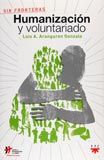New Spanish Books: The online guide of titles from Spanish publishers and literary agents with rights for translation in the UK. To consult titles available in other markets please click on the above links.
HUMANIZACIÓN Y VOLUNTARIADO

Volunteering—praised by some, reviled by others, but well known by all—represents the possibility for every person to have a home, a roof over their heads, irrespective of faith, or where they come from, or economic circumstances, or any other factor; they can feel recognition for who they are at the same time as enjoying the benefits of being a citizen. Volunteering, when it is at an advanced or mature stage, takes humanization as a prime motivator; it moves with the sense of dignity each person possesses. In this context, the human being is the alpha and omega—before and after qualitative assessments, training, programmes, evaluations, the human being is the first and last consideration. Humanization, far from reducing concrete action, forms part of a chain, changing attitudes so that people will more naturally want to volunteer and help the socially excluded.
